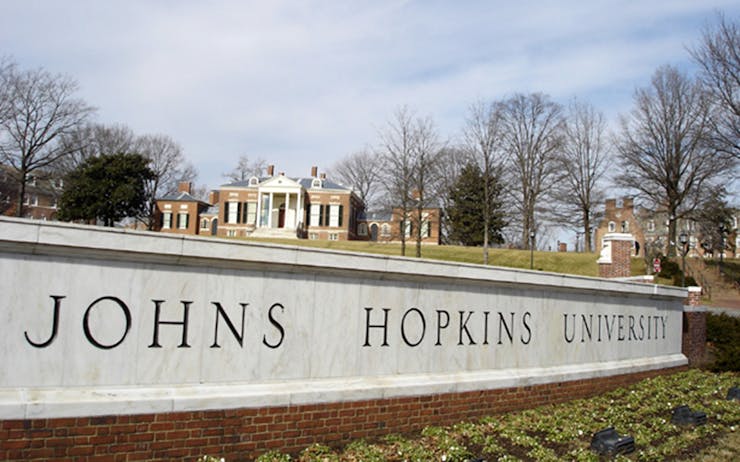Controversy over the poor quality and low potency of US government-grown cannabis has apparently caused one of the nation’s leading research universities to pull out of a federally approved study into cannabis and post-traumatic stress disorder in veterans.
Johns Hopkins University was slated to help conduct the multiyear clinical trial, sponsored by the nonprofit Multidisciplinary Association for Psychedelic Studies, (MAPS). But last week Sean Keirnan, president of the advocacy group Weed for Warriors, called the university and was surprised to hear, in a recorded message, that Johns Hopkins was no longer involved in the study.
'Our goals for this study weren't in alignment.'
In an open letter sent Monday to university President Ronald Daniels, Keirnan questioned the lack of a formal announcement regarding the school’s withdrawal from the MAPS trials, and asked for an explanation into how and why the decision was made.
When pressed by Leafly for a response, a spokesperson for Johns Hopkins University released this statement earlier this morning:
“It is Johns Hopkins’ mission to conduct high quality scientific research and save lives. Johns Hopkins elected to withdraw from the MAPS study of cannabis in veterans with PTSD prior to any participant enrollment because our goals for this study weren’t in alignment. Johns Hopkins remains dedicated to helping military veterans, finding improved treatments for PTSD, and conducting innovative research to enhance our understanding of both the risks and benefits of cannabis/cannabinoids.”
“Alignment of goals” aside, a MAPS spokesman told Leafly that the school quietly withdrew from the study several weeks ago. The primary reason, said Brad Burge, the group’s director of communications and marketing, was publicity surrounding the quality of the marijuana being used in the PTSD trials.
“NIDA wasn’t able to provide the relatively high THC level that we wanted to look at,” Burge said. “We asked for a 12 percent THC strain, and they were only able to get us a 10 percent.”
The doctor overseeing the study was less charitable in her description.
“It didn’t resemble cannabis. It didn’t smell like cannabis,” Dr. Sue Sisley told PBS NewsHour earlier this month. There were also some questions about the government-grown cannabis being contaminated with mold.

Stems and all: This is the “research grade” cannabis the National Institute on Drug Abuse sent to scientists conducting a federally-approved study on PTSD.
One More Challenge to Overcome
The move by Johns Hopkins isn’t likely to derail the study, which was given formal approval by both the U.S. Drug Enforcement Administration (DEA) and the federal Food and Drug Administration (FDA). The research also received a grant of more than $2.1 million from Colorado’s Department of Public Health and Environment (CDPHE).
Shop highly rated dispensaries near you
Showing you dispensaries near76 military veterans are scheduled to take part in the study. Half the participants are to be tested at an outpatient MAPS facility in Arizona, while the other half were originally set to be monitored by Johns Hopkins researchers in Maryland.
Without the university’s participation, Burge said, all veterans in the study will now have to be enrolled in Arizona’s medical cannabis program.
MAPS: Let Scientists Study Clean, Real Cannabis
MAPS doesn’t just support scientific research; the association also advocates for policy issues around cannabis. The controversy surrounding poor-quality cannabis provided by the National Institute on Drug Abuse (NIDA) apparently put the Johns Hopkins researchers in a difficult position.
“Johns Hopkins didn’t want to focus on the policy issues,” MAPS spokesman Burge told Leafly, “specifically the issues related to the NIDA monopoly on marijuana for research. Johns Hopkins of course gets funding from NIDA and may have not wanted to be criticizing NIDA’s supply of marijuana and the monopoly on the marijuana research.”
For decades—and until only recently—a DEA-licensed cannabis farm at the University of Mississippi was the only place where scientists in the U.S. could obtain government-approved cannabis for their clinical research. But the farm, contracted by NIDA since the 1960s, has faced criticism for the questionable quality of the cannabis grown there. Not only are THC levels significantly less than what’s commonly found on state-legal medical marijuana markets, but levels of yeast and mold found on some samples of NIDA-produced cannabis exceed guidelines for cannabis in legal states.
NIDA: Looking Into This Higher THC Thing
A statement on the NIDA website, revised earlier this month, says the agency has supplied cannabis to researchers for more than 40 years “without any known health consequences from contaminants.”
“There is currently no universally accepted standard for levels of mold and yeast on marijuana and different health organizations set cutoffs for acceptable levels spanning an enormous range,” the statement says, adding that NIDA is conferring with the FDA to determine “what analyses and specifications are appropriate for NIDA-supplied marijuana.”
The agency has also said it’s exploring the possibility of growing cannabis with higher THC levels, closer to what’s currently being used by patients in legal states.
This latest challenge to the PTSD study underscores the obstacles to federally approved research into the effects of cannabis—research that often proceeds at a snail’s pace. Efforts to get the MAPS study off the ground were stalled for nearly five years before the DEA granted its approval last year.
“Now it’s in one place,” Burge said, “but that should have no statistical or enrollment impact.”






